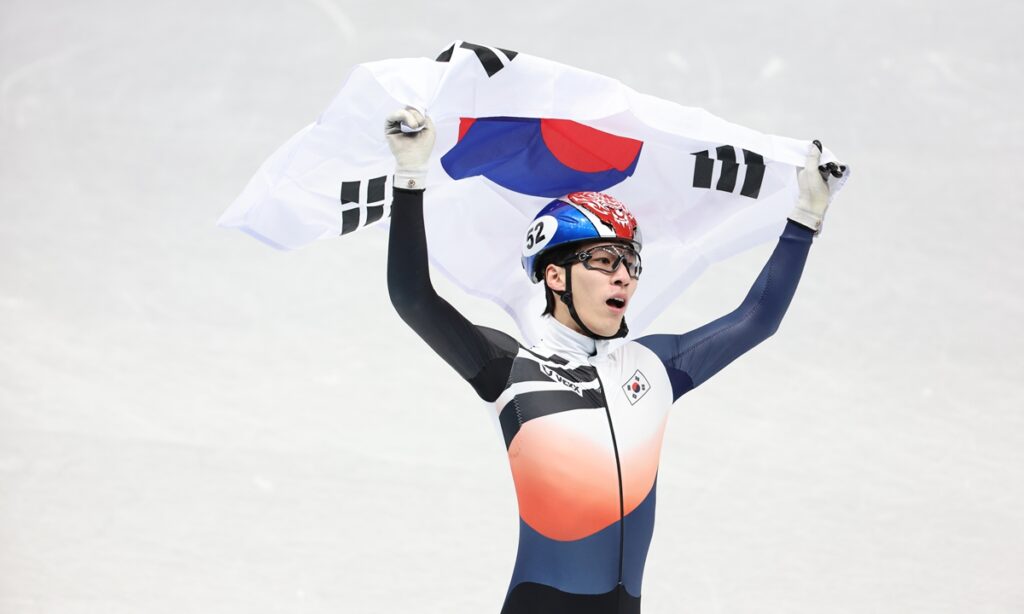South Korean short-track skater Hwang Dae-heon captured gold in the men’s 1500 meter short track final on Wednesday night, two days after he was disqualified at the 1000 meter semifinal that had caused heated controversy over the penalty as well as discussion over South Korea’s aggressive competing strategy in the sport.
Hwang claimed the gold in two minutes and 9.219 seconds to beat Canada’s Steven Dubois by 0.035 seconds in a tight finish.
South Korean President Moon Jae-in sent a congratulatory message to Hwang shortly after he won the gold medal, which is also Hwang’s first career Olympic gold medal, according to Yonhap News Agency.
Unlike the controversy following the penalty two days ago, Hwang’s champion won respect from Chinese netizens, who said that it showed Hwang’s real ability without controversy, which is how the Games should be played.
Sport analysts said that the win also indicates that the South Korean team has changed its strategy to lead from the beginning rather than try to pass others in the second half of the competition, which probably is the best strategy in the game.
Wednesday’s uncontested win came after Hwang and his teammate Lee June-seo were disqualified for making an illegal late pass and lane change, respectively, in the semifinals of the men’s 1,000 meters on Monday night, which soon caused controversy. The South Korean team had protested to the International Skating Union (ISU) over the issue, but was rejected.
South Korean leaders at Beijing 2022 met virtually with senior ISU officials on Wednesday to express their concerns about the penalties again. ISU officials said their position on the issue hasn’t changed from Tuesday and that the organization is striving for fairness in officiating, according to media.
The Chinese Embassy in South Korea also stressed the fairness of rules in the Beijing 2022 Winter Olympic Games amid the controversy.
Short-track speed skating is a dangerous sport that likely generates controversy. In order to maximize the safety of participating athletes and improve the fairness and impartiality of the competition, the ISU has continuously revised, improved and refined the competition rules, the spokesperson of the Chinese Embassy in South Korea said in a statement on Wednesday.
The short-track speed skating event of the Beijing Winter Olympics is carried out according to the latest revised rules of the ISU. The competition site is also equipped with a Cheetah ultra-high-speed 4K orbital camera with a speed of up to 90 kilometers per hour, which provides sufficient technical support and basis for the referee, the spokesperson noted, while slamming some South Korean media and politicians who tried to hype the issue to stir hatred against China.
The South Korean team insisted that they had not violated any rules. But Chinese experts pointed out that the penalties are fair according to the latest rules of the ISU, which were stricter and detailed than the South Korean team was used to. The 4K high-definition camera system is able to accurately capture any foul play during the event.
According to the detailed new rules, skaters who try to pass others in front at the end of the straight area would take the responsibility for crash when they try to pass or change lane, which, according to observers, explained why Hwang deserved the penalty on Monday.
Short-track speed skating is a dangerous sport. Fouls, crashes and injuries are not rare.
Rather than questioning the penalties, a more urgent mission for short-track speed skating teams, especially those who would like to apply an aggressive strategy such as South Korea, is to adapt to new rules and technologies to play more carefully. And this would also be favorable for the healthy development of the sport, said insiders.
“The different performance of Chinese and South Korean skaters in the 1,000 meters speed skating semifinal proved that the Chinese team adapted to the new rules better and was more careful. But the South Korean team still had not changed its old ways,” Wang Meng, China’s four-time Olympic short-track speed skating champion and current head coach of the Chinese speed skating team, told media.
Skaters sometimes would commit a foul when their skate blades crossed the starting line before the competition starts. Other behaviors include committing fouls like a skater impeding and disturbing other skaters by deliberately pushing, crashing and kicking them, or unnecessarily leaving the track and slowing down, according to observers.
Before the PyeongChang 2018 Winter Olympic Games, there was no standard penalty code and manual for short-track speed skating. The ISU did not start formulating a detailed manual until after the 2018 Games given the historically high penalties, 46, that have been issued and following controversies, observers said.
After 2018, the ISU adjusted the rules. The judges would review videos on every fault and slap a penalty in reference to a specific code. Yellow and red cards can also be handed out. A skater would be disqualified after receiving two yellow cards or one red card, according to observers.
South Korean skater Hwang Dae-heon claimed the men’s 1,500m title on Wednesday, giving South Korea its first gold medal at the Beijing Winter Olympics. Photo: Li Hao/GT




